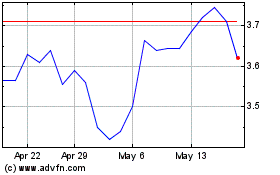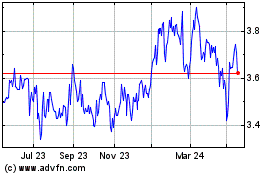Australia Eyes Privatization of Public Health and Welfare Payments
February 09 2016 - 12:00AM
Dow Jones News
CANBERRA, Australia—Australia's government is considering a
multibillion-dollar privatization of public health and welfare
payments, as conservatives look for new ways to refill budget
coffers emptied by an economic slowdown and collapsing prices of
the country's resource exports.
In a move that would be risky in a charged election year, due to
the popularity among voters of the country's generous health and
welfare system, Prime Minister Malcolm Turnbull said on Tuesday the
conservatives were looking at outsourcing a range of government
payments worth up to 50 billion Australian dollars (US$35.43
billion).
"The government is as always totally committed to Medicare," Mr.
Turnbull told Parliament. "What we are looking at…is improving the
delivery of government services, looking at ways to take the health
and aged care payment systems into the 21st century."
Treasurer Scott Morrison may test market appetite for a deal
soon after the next national budget statement in May, which could
clarify the future of several privatization offers being looked at
by the conservatives.
Australia is struggling to adjust to a fading resources boom
that is shrinking government coffers. A sharp slowdown in mining
investment has forced the government to look harder for ways to
trim a budget deficit that grew markedly under the previous Labor
administration.
A midyear budget update in December showed that the country's
deficit was expected to widen to A$37.4 billion this fiscal
year—amounting to 2.3% of gross domestic product—while net debt was
forecast to reach A$278.8 billion, or 16.9% of GDP, in 2015-2016,
peaking at 18.5% of GDP in 2017-2018.
Treasury Secretary John Fraser last month warned spending was
too high and tough reductions would need to be made. Outlays in the
fiscal year through June are forecast to be 25.9% of GDP, with
spending for large taxpayer programs such as aged care, health and
unemployment payments still rising. The government wants to limit
spending below 25% of GDP.
But Finance Minister Mathias Cormann has so far shied away from
aggressive privatization programs with national impact like the
U.K. government's £ 1.7 billion (US$2.45 billion) sale of the Royal
Mail, wary of a backlash in a country where voters in far-flung
regional areas worry they will be left worse off.
Mr. Cormann successfully sold private health insurance provider
Medibank Private for A$5.6 billion in 2014. He is also weighing a
sale of the national rail network, which manages assets worth an
estimated A$4.4 billion, stretching across five states. The future
of that offer could also be clarified in the budget.
But conservative allies in Queensland state suffered a shock
first-term election defeat last year after they pursued power
privatizations, a move which a majority of voters had opposed.
The plan being considered by Mr. Turnbull could be even riskier,
leading to criticisms that the conservatives may seek to take the
country's cherished but costly Medicare public health system down a
private health path like the U.S.
"If Malcolm Turnbull wants to make the 2016 federal election a
fight about Medicare, Labor will stand up for Medicare for all
Australians," Labor Opposition Leader Bill Shorten said
Tuesday.
The privatization of Medicare, pharmaceutical and aged-care
payments—allowing the government to save billions of dollars in
operating expenses—would attract keen interest from Australian
companies with large payment systems like communications giant
Telstra and even the Australia Post, still owned by the
government.
Foreign multinationals may also bid, including New Zealand
services provider Serco, Fuji-Xerox and Accenture, the West
Australian newspaper said.
Mr. Turnbull said the Medicare system in particular had lagged
behind digital payment systems used by many private-sector
companies.
To limit political fallout, a privatized payment system would
likely have strict caveats, including no change in current fee
payments and no reductions in public health spending. Mr. Turnbull
has promised no radical reforms without public consultation ahead
of elections which are expected sometime after August.
Write to Rob Taylor at rob.taylor@wsj.com
(END) Dow Jones Newswires
February 09, 2016 00:45 ET (05:45 GMT)
Copyright (c) 2016 Dow Jones & Company, Inc.
Medibank Private (ASX:MPL)
Historical Stock Chart
From Jan 2025 to Feb 2025

Medibank Private (ASX:MPL)
Historical Stock Chart
From Feb 2024 to Feb 2025
